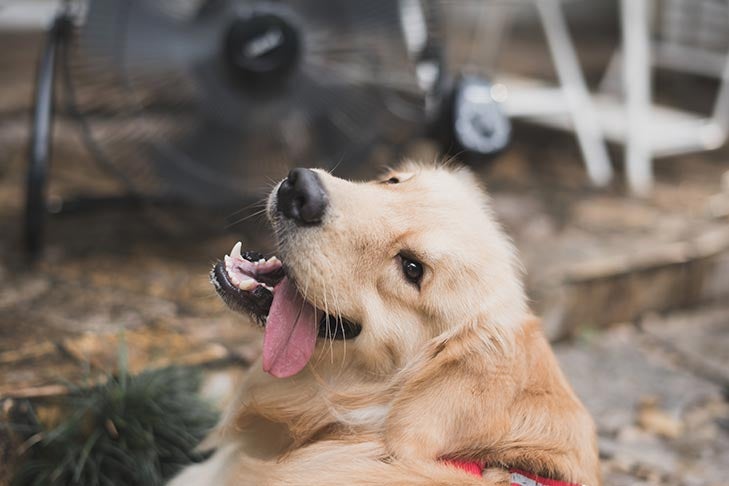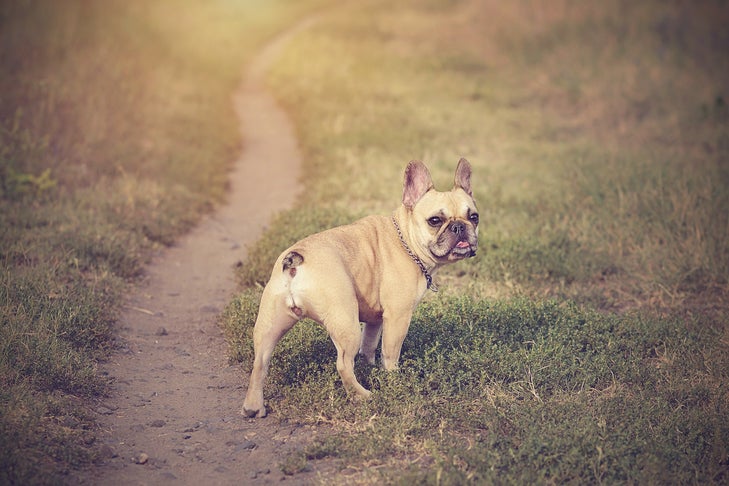
Whether they’re silent but deadly or startlingly loud and smelly, dog farts are something that no one wants to deal with. Not only are these farts embarrassing for you and your guests, they indicate that your dog could be in pain from excess gas. While the occasional gaseous emission from your pooch is a normal and unavoidable part of life, excessive gas is not.
There are several causes of dog farts, from gastrointestinal issues to food intolerance, so you’ll need to visit your veterinarian to determine what’s triggering your dog’s smelly gas. Here, we explore the possible reasons behind dog farts and how to stop them.
Why Does My Dog Fart So Much and Stink?
The causes of dog farts vary but they are generally the same as in people. After a meal, bacteria in the intestinal tract break down the food into nutrients that the body can use. During this process, stinky hydrogen sulfide gas releases as a by-product of digestion for certain foods in the colon. That gas becomes trapped and farting is the only way for your dog to get it out.
Some dogs also tend to swallow a lot of air when they eat and drink, especially speed-eaters and short-nosed brachycephalic breeds including Pugs, Boston terriers, Shih Tzus, and Lhasa Apsos. Like the gas formed in their digestive tract, this swallowed air is also expelled by farting.
So, is it normal for dogs to fart a lot? A bit of gas is normal each day, but if you feel like you need to wear a gas mask around your dog, then something is amiss. This is especially true if the farting is a recent development and your dog has diarrhea or you find blood in their stool.
Rule Out a Gastrointestinal Issue or Food Intolerance
Several health issues can lead to gastrointestinal issues in dogs including:
- Canine colitis
- Irritable bowel syndrome (IBS)
- Intestinal parasites
- Inflammatory bowel disease
- Cancer
- Pancreatitis
That’s why it’s so important to visit the vet to see why your dog is farting all the time. Remember, your dog is probably in pain from all that gas too, says Dr. Sara Ochoa, DVM, Veterinary Consultant for DogLab. With treatment for these conditions, your dog’s farts should begin to decrease.
To figure out whether your dog has any food allergies or a food intolerance, your vet may put them on a restricted diet to weed out the offending ingredients. Once you know what substances are causing your pup’s farts, eliminate them from their daily diet.

Change Your Dog’s Diet Slowly to Avoid Farts
Dogs have pretty sensitive tummies and when you suddenly change their food to a new brand, you might deal with days or weeks of dog farts.
To put a stop to dog farts caused by dietary changes, slowly transition your pup to a new food by swapping out their old food in small increments over one week. This acclimates your pup’s system to the new food, preventing digestive issues like gas and diarrhea.
Don’t Give Your Dog Table Scraps
Table scraps and human foods are notorious for giving dogs digestive issues including gas. Unlike us, dogs can’t easily digest these table scraps, especially those high in fats or sugars. Plus, many table scraps are dangerous for dogs to eat, so when your pup comes begging to the table, it’s best to ignore them for the good of their tummy—and your nose.
“Most dogs are lactose intolerant, so giving them anything with dairy will upset their stomachs,” says Dr. Ochoa. For this reason, skip feeding your dog anything containing milk, cream, or cheese.
Keep Your Dog Out of the Trash
Dogs are curious creatures who enjoy exploring the trash and even your cat’s litter box for tasty treats. Not only is this dangerous for your dog, but the behavior can lead to a lot of stomach upset and gaseous emissions. Prevent your pup from accessing your trash by putting it in a covered can.
During walks, always steer your dog clear of anything suspicious on the ground, like trash that others have discarded. And teach your dog the “Leave-it” command so that you can immediately get them to drop any trash that you may come upon.
Avoid Fart-Inducing Foods
Some foods, even those that are safe for your dog to eat, are more likely than others to lead to farting. Steamed vegetables like cauliflower, broccoli, and Brussels sprouts are healthy treats for dogs but too much of them could lead to smelly farts.
Speak with your veterinarian to see if a highly digestible, low-residue diet could benefit your dog. These diets contain fewer hard-to-digest ingredients like peas, fiber, beans, and soybeans, meaning that there will be less gas after your dog eats.

Slow Down Speed Eaters and Keep Dogs Active
Dogs that wolf down their food like they’re in a race also end up swallowing a lot of air, leading to farts later on. Divide your dog’s daily portion into several smaller ones and feed them to your pup throughout the day to deal with this behavior. Or use a slow-feed dog dish that features a raised center to make swallowing large amounts of food impossible for your dog.
In addition to slowing down your pup’s eating, keep your dog active with regular exercise and playtime. Exercise helps improve digestion and reduce farting.
What Can I Give My Dog for Stinky Gas?
Once your veterinarian rules out a medical or dietary cause of your pup’s excess gas, they may recommend a medication like simethicone or an antacid to help reduce your dog’s farts, says Dr. Ochoa. Supplementing your dog’s diet with probiotic powders may also help reduce farting. Finally, dog foods and treats that contain ingredients like Yucca schidigera and zinc acetate may help reduce the odor of your dog’s stinky gas.
While dog farts are a smelly but normal part of life, excess gas could indicate a serious medical condition, so the first step is always to visit your vet. And, dogs aren’t just good at emitting odors, they can track them too, so consider getting involved with AKC Scent Work.
This article is intended solely as general guidance, and does not constitute health or other professional advice. Individual situations and applicable laws vary by jurisdiction, and you are encouraged to obtain appropriate advice from qualified professionals in the applicable jurisdictions. We make no representations or warranties concerning any course of action taken by any person following or otherwise using the information offered or provided in this article, including any such information associated with and provided in connection with third-party products, and we will not be liable for any direct, indirect, consequential, special, exemplary or other damages that may result, including but not limited to economic loss, injury, illness or death.

